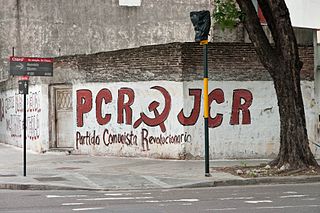Communism in Peru was represented by far-left-oriented organizations that refer to themselves as communist (comunista) parties, movements, organizations, groups, etc.

The Communist Party of Argentina is a communist party in Argentina. It is a member of the Unión por la Patria the former ruling coalition which supported former President Alberto Fernández.

The Brazilian Communist Party, originally the Communist Party of Brazil, is a communist party in Brazil, founded on 25 March 1922. Arguably the oldest active political party in Brazil, it played an important role in the country's 20th-century history despite the relatively small number of members. A factional dispute led to the formation of PCdoB in the 1960s, though both communist parties were united in opposition to the Brazilian military government that ruled from 1964 to 1985. But with the fall of the Soviet Union and the collapse of communism circa 1990, the party lost power and international support. An internal coup in 1992 divided the party and formed a new party, called Popular Socialist Party, using the former identification number of the PCB, 23. That party has since moved towards the centre and now goes by the name Cidadania.

The Spanish Communist Workers' Party is an anti-revisionist Marxist-Leninist communist party in Spain. It was founded in 1973, when Enrique Líster revolted against the Eurocommunist line of Communist Party of Spain (PCE) general secretary Santiago Carrillo. The party published Análisis.

The Communist Party of Spain (Marxist-Leninist) is a communist political party in Spain, formed in 1964 through the merger of splinter groups of the Communist Party of Spain (PCE).

The National Congress is the legislative branch of the government of Honduras.

The Guatemalan Labour Party was a Marxist-Leninist party in Guatemala. It existed from 1949 to 1998. It gained prominence during the government of Jacobo Arbenz. It was one of the main forces of opposition to the various regimes that followed Arbenz's overthrow, and later became a constituent of the URNG guerrilla coalition during the later phase of the country's Civil War.

Communist Party of Andalusia is the federation of the Communist Party of Spain (PCE) in Andalusia.
The Party of Communist Unification in the Canaries was a communist party working for the political autonomy of the Canary Islands. PUCC appeared sometime in 1975, and held its first conference in 1978. PUCC originated from OPI a leftist split of the Communist Party of Spain. PUCC worked underground during caudillo Francisco Franco's Spanish State. The leader of PUCC was Paco Tovar Santos, and its internal bulletin was called Comunista ("Communist").

The Communist Party of Mexico is a communist party in Mexico. which preserves the line of its communist identity features: internationalism of the proletariat, Leninist organizational theory based on democratic centralism, and Marxism-Leninism.

The Revolutionary Communist Party is a Marxist–Leninist–Maoist political party in Argentina.
The Revolutionary Action Party was a leftist political party in Guatemala during the ten-year Guatemalan Revolution. Formed in 1945, the party went through a series of mergers and fractures before dissolving in 1954 after the United States-backed coup d'état.

General elections were held in Honduras on 10 October 1954. The elections were relatively honest. and saw Ramón Villeda Morales of the Liberal Party emerge as the most popular presidential candidate with 48% of the vote. However, the constitution required Congress to confirm the president if no candidate received a majority in the popular vote. The Liberals did not have a majority in Congress, and the National Party and National Reformist Movement (MNR) agreed to block Villeda's candidacy, although they were unable to agree on a candidate of their own. The two parties boycotted the confirmation session in November – an idea proposed by US Ambassador Whitting Willauer – meaning those present did not form a quorum.

The Spanish Democratic Socialist Party was a political party in Spain, active during the transition to democracy. The party was founded in 1975. The party sought to establish a democratic constitution in Spain. Antonio García López was the general secretary of the party.
Juan Pablo Wainwright Nuila was a Honduran revolutionary leader. A former member of the Canadian Army in World War I, he joined the Communist Party in El Salvador in 1928. He was expelled from the country that year, returning to Honduras. He was later identified as one of the major communist agitators in Latin America. After an escape from a Honduran prison in 1930, he was arrested in Guatemala in January 1932. Following a confrontation between Wainwright and Guatemalan dictator Jorge Ubico in a prison office, Ubico ordered Wainwright's execution.
Agapito Robleda Castro was a Honduran politician. His nom de guerre during his underground years was 'Renato Pereira'.

The 1827 Honduran coup d'état was a military takeover of the Honduran government under Dionisio de Herrera, initiated on April 4 by the then Lieutenant General José Justo Milla.

Graciela Amaya de García was a Central American feminist and labor organizer. Born in El Salvador and trained as a teacher, she moved to Honduras at the age of twenty. Joining the socialist movement, she became a party operative, founding trade unions to resist the labor practices of the industrialists operating in the country. She formed the first feminist organization of Honduras, the Society of Feminist Culture, in 1923 and organized night schools for working women to teach them about their rights. Expelled from Honduras for leading demonstrations against the government in 1944, she fled home to El Salvador but remained only a few months because a coup d'etat brought in a dictatorship. Relocating to Guatemala, García continued with her activities organizing labor and educating working-class people, until she was expelled by the president in 1946. Moving to Mexico, she worked for the Secretariate of Education and wrote articles in support of leftist politics and women.

 [1]
[1] 












